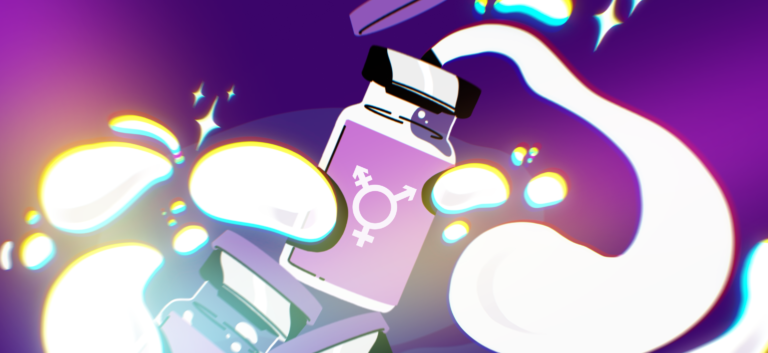Does testosterone make you gay?
This question comes up a lot. Sometimes with humor, sometimes with anxiety, but always with curiosity. And it makes sense. Many trans and non-binary people notice changes in attraction, identity, or how they relate to desire after starting testosterone (also known as “T”).
In a survey conducted by Plume Clinic, 45.5% of participants said their sexual attraction changed after starting gender-affirming hormone therapy (GAHT or sometimes called HRT). Another 16.3% said they weren’t sure, and 38.2% said it didn’t change.
Join thousands of trans and non-binary folks getting expert gender-affirming care with Plume Clinic.
So, what’s going on here?
Let’s talk about it.
What the Myth Gets Wrong
Let’s be clear: testosterone does not “turn” someone gay. It’s a hormone, not a switch that flips your orientation.
The myth that T makes you gay persists because some people do experience shifts in how they understand their attraction after starting GAHT. But what’s actually happening is a lot more nuanced and more liberating.
Increased Libido
One of the most well-known effects of T is a boost in sex drive. You might notice more frequent or intense desire, which can draw your attention to attractions you hadn’t explored before, or hadn’t felt comfortable acknowledging. That doesn’t mean your orientation has changed. It might just be easier to notice what was already there.
Less Dysphoria = More Space for Desire
When dysphoria eases and gender congruence increases, a lot can shift, emotionally, mentally, and sexually. Some folks feel safer, more confident, and more present in their bodies. For example, someone who didn’t feel good being desired as a woman might now feel excited being seen as a man. That shift can affect how attraction feels, and who it feels good with.
New Comfort = New Questions
Feeling more grounded in your body and identity can bring clarity, but also curiosity. You might find yourself rethinking old labels or opening up to new types of connection. Especially if your past relationships or attractions were shaped by survival, safety, or social expectations.
That doesn’t mean testosterone is changing your orientation; it just means you’re more able to explore it now.
Real Talk: Why Attraction Might Shift During Transition
Sexuality is fluid. That’s true for everyone, but especially for trans people, who often undergo major shifts in how they feel in their bodies, how they relate to desire, and who they’re surrounded by.
If things feel different after starting T, you’re not alone. Here are a few reasons that could be happening:
- Increased sex drive can make attraction more noticeable or harder to ignore.
- Feeling more confident or affirmed in your gender might make emotional or physical intimacy feel safer or more exciting.
- Being immersed in queer and trans community might open you up to new ways of thinking about connection, love, and identity.
- Labels may evolve even if attraction itself doesn’t. For example, someone who was seen as a straight woman pre-transition might now identify as a gay man.
None of this means testosterone is making you someone you’re not. It might just be helping you get closer to who you’ve always been.
“Gay Panic”
If you’ve always been into women, but suddenly find yourself attracted to men or masc folks after starting T, that can feel jarring. You might wonder:
- “Am I becoming someone I didn’t plan to be?”
- “What if people think I’m a gay man?”
- “Do I still belong in the communities I was part of before?”
These feelings are valid. But change doesn’t mean you’ve lost yourself; it might mean you’re discovering more of who you’ve been all along.
You’re Not Broken—You’re Expanding
If attraction shifts during transition, that doesn’t mean anything is wrong. You’re not broken. You’re just learning what feels right, now that you have space to feel it.
Testosterone isn’t changing your orientation. It’s helping you connect more deeply with your body and desire.
Here’s a more grounded way to think about it:
- It might reveal parts of your sexuality you weren’t able to access before.
- It might make intimacy feel safer, more affirming, or more fun.
- It might bring clarity or raise new questions. And that’s okay.
You don’t have to rush to label yourself. You don’t owe anyone a neat explanation.
So…Does Testosterone Make You Gay?
No. Testosterone does not make you gay.
Testosterone can be powerful. But it’s not a personality transplant. It’s not mind control. It’s not a gay ray. It’s just one tool in the journey of becoming more yourself.
Sexual orientation is personal, complex, and sometimes surprising. Starting testosterone can be a life-changing part of gender affirmation, but it doesn’t dictate your sexuality.
Some people stay attracted to the same genders. Some find their desires shift. Others realize their old labels never quite fit. All of that is normal.
Don’t forget that being gay, bi, pan, queer, or questioning is not something to fear. You don’t have to be afraid of desire. You get to define what love, connection, intimacy, and identity look like for you.



